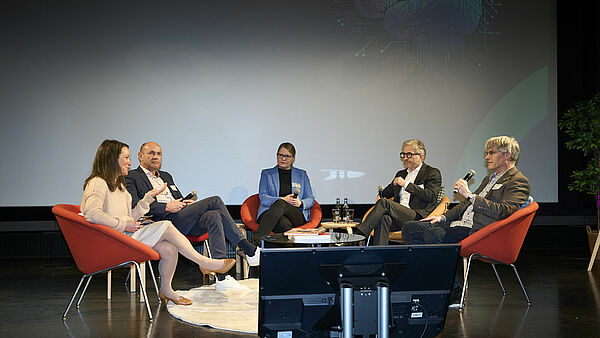At the two-day AI Congress organised by the Digital Agenda of the Rhineland Regional Council (LVR) in Bonn, experts discussed how AI-based solutions can support inclusion in the world of work. inIT was represented by board member Prof. Dr. mult. Carsten Röcker, who contributed valuable insights from research and practice to the panel discussion.
AI and inclusion in the world of work: opportunities and challenges in dialogue
Panel 11 focused on the question of how AI can contribute to improving participation in working life. Carsten Röcker discussed with other experts the potential, challenges and ethical aspects of using AI in inclusive work contexts.
Practical examples: Digital assistance systems in different work environments
The discussion focused on practical applications. Carsten Röcker presented the research project OmniAssist. The aim of the project was to use digital assistance systems to help people with cognitive impairments to work independently, for example in building cleaning, gardening and landscaping, or in the hotel industry. Specific solutions were successfully tested in six companies and some have been integrated into everyday working life.
"The project enabled us to establish a close link between our research and the participating companies. This cooperation made it possible to carry out practical analyses of potential and to implement specific use cases in a targeted manner - always in line with the individual requirements and conditions on site," says Carsten Röcker.
One key conclusion was that the need for AI-based assistance systems is great - as is the variety of possible applications. At the same time, it became clear that organisational structures and decision-making processes within companies play a key role.
Perspectives for the future
In addition to Carsten Röcker, Detlef Girke (WERTE:IT), Beate Milluks (Bundesarbeitsgemeinschaft der Berufsbildungswerke e. V.) and Alexander Stricker (Charamel GmbH / Alangu GmbH) discussed ethical issues, opportunities and risks associated with the use of AI in the context of work. The panellists agreed that AI can make the world of work more inclusive - provided that the technologies are developed and implemented together with future users. At the same time, it was clear that the use of AI also poses challenges - for example in terms of data protection, technical dependencies or insufficient customisation to individual needs.
A recording of the panel discussion is available here:


